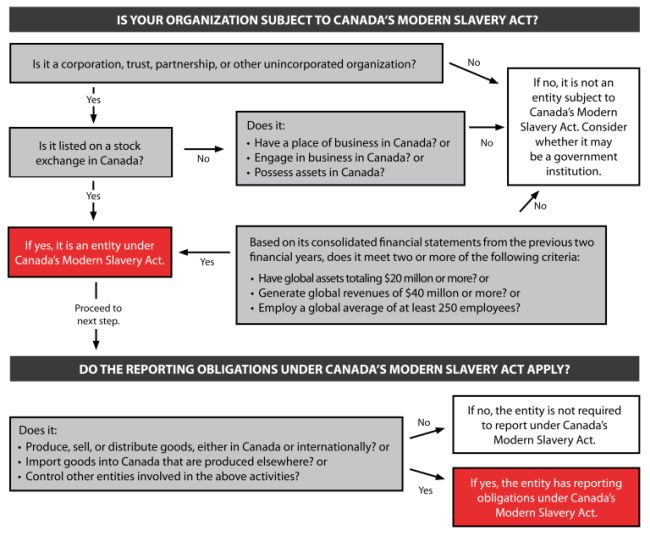Certain entities are required to disclose their efforts to combat forced labour and child labour within their supply chains by May 31, 2024. Read below to find out if this applies to your business and what you need to do to comply.
New laws
Environmental, social, and governance (ESG) factors are a critical component of modern business, guiding strategic decision-making, shaping corporate culture, and influencing stakeholder trust.
In response to mounting global concerns about unethical supply chain practices, the ongoing presence of child labour, and the alarming rise of forced labour in the modern economy, Canada has taken a significant step forward in the fight against human rights abuses with the enactment of the Fighting Against Forced Labour and Child Labour in Supply Chains Act (Act). In force from January 1, 2024, the legislation aims to combat modern slavery by promoting responsible business conduct in supply chain management.
Does your business need to comply?
Corporations, trusts, partnerships, and other unincorporated organizations that meet certain establishment requirements and/or revenue, asset, or employee thresholds may be subject to the new modern slavery laws. However, the reporting obligations under the Act will only apply to the extent that the entity produces goods domestically or internationally and/or imports goods into Canada (or controls an entity that does either).
The below flowchart is provided to assist businesses to assess whether they may be subject to and have reporting obligations under the Act.

NOTE: Many government institutions are also subject to the Act, although different requirements may apply.
What are the reporting requirements?
Any business with reporting obligations under the Act is required to prepare an annual report on the steps it took during the previous financial year to prevent and reduce the risk that forced labour or child labour was used in its supply chains either in the production of its own goods or goods it imported into Canada. The report must include information covering:
- Entity structure, activities, and supply chains;
- Policies, training, and due diligence processes in relation to forced labour and child labour;
- Identification, management and remediation of its supply chain risks; and
- Processes for assessing the effectiveness of its actions.
The report must be provided to the Minister of Public Safety and Emergency Preparedness, made available to the public, and (where applicable) a copy provided to shareholders no later than May 31, 2024. Relevant entities must also complete an online questionnaire on their assessment and management of risks related to forced and child labour in their supply chains by the same date. Further information on the reporting requirements is available at Public Safety Canada's website.
What to do next
Reporting pursuant to the new modern slavery laws is a mandatory component of a larger compliance obligation and entities can expect that their customers and other stakeholders will increasingly seek information on what the business is doing to combat modern slavery. To meet the Act's requirements, businesses are urged to proactively adapt their operations and supply chain practices – fostering transparency, ethical conduct, and a strong commitment to eradicating forced labour and child labour.
Undertaking a risk assessment, reviewing best practices, and engaging with suppliers are foundational first steps. Aligning compliance efforts with overall business strategy ensures efficiency and effectiveness in supply chain management. This is particularly important for entities with international operations subject to other modern slavery laws (i.e. California, the United Kingdom, Australia, France, Germany, and Norway) as reporting requirements, approval processes, and deadlines may differ across jurisdictions.
Consequences of non-compliance
Non-compliance with the Act exposes businesses to various legal risks. Fines of up to $250,000 CAD may apply to those who fail to report, knowingly provide false or misleading information, or obstruct an authorized person exercising powers under the Act. Directors, officers, or agents implicated in violations may also face similar penalties. Operationally, an import ban may be imposed and goods may be seized at the border if reports suggest the involvement of forced labour or child labour.
Managing risks and enhancing supply chain due diligence therefore are paramount considerations for all businesses. Indeed, embracing ESG as a core component of business strategy is no longer optional but essential for fostering sustainable growth, maintaining competitive advantage, and meeting the evolving expectations of consumers and investors in today's socially conscious world.
The content of this article is intended to provide a general guide to the subject matter. Specialist advice should be sought about your specific circumstances.


